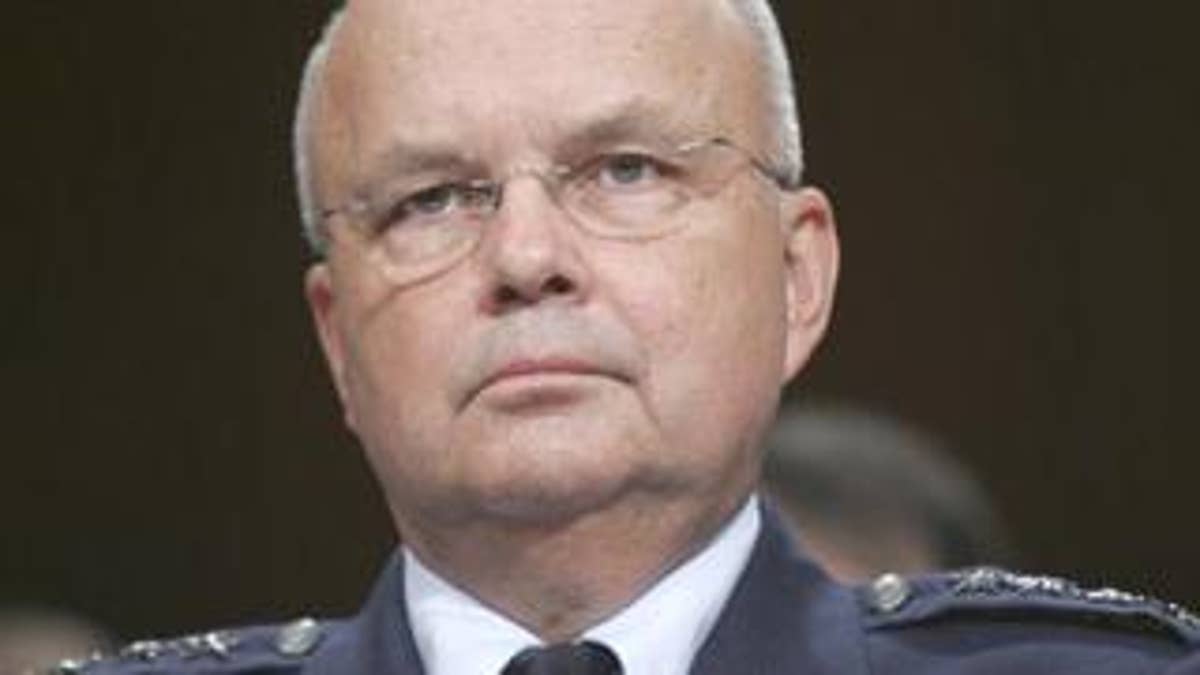
WASHINGTON -- The former head of the Department of Homeland Security under President George W. Bush warned Friday that the release of documents detailing harsh interrogation methods holds major risks for U.S. security.
Bush's former CIA chief added that the release will have a chilling effect on officers assigned to conduct interrogations.
"Whenever you release material that secretly relates the way we conduct operations against terrorists you run two risks. One is that you're giving terrorists insights into things they need to prepare for, and they do prepare. And the second thing is you're sending a message to our allies that we're not reliable in terms of safeguarding confidential information," former Department of Homeland Security Secretary Michael Chertoff told FOX News.
Gen. Michael Hayden said the release of documents that outlined actions taken by CIA interrogators is the mark of political maneuvering and hurts the CIA's ability to conduct the job it is tasked with doing.
"It really gets into the head of CIA officers who are consistently asked to do things that are on the edge, lawful, but on the edge, in the defense of the republic. That's the unique role of the Central Intelligence Agency.
"We're asked to do things that no one is asked to do, no one else is allowed to do. And now I think what this has done is put this very powerful element of doubt in the minds of CIA officers when they will be asked to do difficult things -- that the legal opinions on which their actions are based are subject to political change and political wind," Hayden said.
President Obama on Thursday announced the end of the interrogation techniques, saying the era of using such tactics as slamming detainees against walls, waterboarding and keeping detainees naked and cold for long periods is over.
Obama absolved CIA officers from prosecution despite calls from some Democratic lawmakers and human rights groups that those who participated should be held accountable.
Obama disagreed, saying in a statement, "Nothing will be gained by spending our time and energy laying blame for the past."
In releasing the documents, the most comprehensive accounting yet of interrogation methods, Obama said he wanted to move beyond "a dark and painful chapter in our history."
The Bush administration memos describe interrogation methods used against 28 terror suspects, the fullest and now complete government accounting of the techniques. They range from waterboarding -- simulated drowning -- to using a plastic neck collar to slam detainees into walls. Other less painful techniques included sleep deprivations, shackles and liquid diets.
One technique approved but never used involved putting a detainee who had shown a fear of insects into a box filled with caterpillars.
The documents also offer justification for using the tough tactics.
A May 30, 2005, memo says that before the harsher methods were used on top Al Qaeda detainee Khalid Sheikh Mohammed, he refused to answer questions about pending plots against the United States.
"Soon, you will know," he told them, according to the memo.
It says the interrogations later extracted details of a plot called the "second wave" to use East Asian operatives to crash a hijacked airliner into a building in Los Angeles.
Terror plots that were disrupted, the memos say, include the alleged effort by Jose Padilla to detonate a "dirty bomb" spreading nuclear radiation.
Human rights advocates argued that Obama should not have assured the CIA that officers who conducted interrogations would not be prosecuted. But Hayden warned that making such suggestions will have a "chilling effect" on CIA operatives.
"It is an absolutely chilling effect," he said. "The absolute last thing you want is to give a CIA officer a lawful order, something he knows will be effective, something that the Justice Department has told him is lawful, and have this poor man or woman handicapping the next off-year election to see if there is going to be durability in the next legal advice that he has been given."
Attorney General Eric Holder said that CIA officials who were involved are in the clear as long as their actions were in line with the legal advice at the time. But he left open the notion that operatives could still be subject to legal woes, assuring them that the government would provide free legal representation to any CIA employees in any legal proceeding or congressional investigation related to the program and would repay any financial judgment.
"It would be unfair to prosecute dedicated men and women working to protect America for conduct that was sanctioned in advance by the Justice Department," Holder said.
Holder also formally revoked every legal opinion or memo issued during Bush's presidency that justified interrogation programs.
Obama said in his statement and a separate letter sent directly to CIA employees that the nation must protect their identity "as vigilantly as they protect our security."
Current CIA Director Leon Panetta said in a message to his employees: "CIA responded, as duty requires."
Obama spokesman Robert Gibbs, traveling with the president in Mexico, added late Thursday that the review process concluded it would be unfair to punish interrogators who worked within the law of the time.
"Hardworking people at the CIA ... did what they were told based on the authorization that they'd been given. The president believes it would be unfair to punish those," White House spokesman Robert Gibbs said Thursday evening in Mexico.
Some parts of the memos were blacked out, and Panetta had pushed for more redactions, according to a government official who declined to be named because he was not authorized to release the information.
The memos produced by the Justice Department's Office of Legal Counsel in 2002 and 2005 were released to meet a court-approved deadline in a lawsuit against the government in New York by the American Civil Liberties Union.
"It's impossible not to be shocked by the contents of these memos," said ACLU lawyer Jameel Jaffer. "The memos should never have been written, but we're pleased the new administration has made them public."
In addition to detailing individual techniques, one memo also specifically authorized a method for combining multiple methods, a practice human rights advocates argue crosses the line into torture even if any individual methods does not.
The Obama administration last month released nine legal memos from the Bush administration. It probably will release more as the ACLU lawsuit proceeds, the officials said.
In addition to abandoning the interrogation techniques, Obama has ordered the CIA's secret overseas prisons known as "black sites" closed and has ended "extraordinary renditions" of terrorism suspects to other countries if there is any reason to believe those countries would torture them. He has also restricted CIA questioning to methods and protocols approved for use by the U.S. military until a complete review of the program is conducted.
In his statement, Obama said he was reassured about the potential national security implications by the fact that much of the information contained had already been widely publicized -- including some of it by Bush himself -- and by the fact that the program no longer exists as it did.
Withholding the memos, Obama argued, would only serve to deny facts already in the public domain.
"This could contribute to an inaccurate accounting of the past, and fuel erroneous and inflammatory assumptions about actions taken by the United States," the president said.
Democratic strategist Eric Yaverbaum, who called himself a fan of Obama's, said the decision to release the memos is a "flawed strategy."
"I think that people who are doing jobs that involve classified information should know that it's classified," Yaverbaum told FOX News. "It will continue to let Obama be the president of transparency but it's not going to accomplish anything. Nobody is going to do anything differently that is a terrorist."




